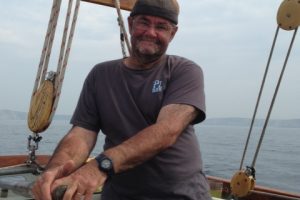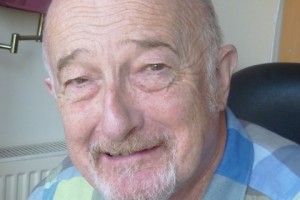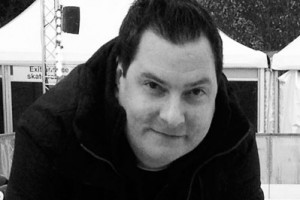Personal stories
Michael’s story – a patient’s experience of acute kidney injury
Share this on – Facebook / Twitter / Linked In


In January 2009, I was a fit 62 year old – jogging three times a week and playing tennis. I felt extremely well and I put my subjective feeling of wellness at 100 – a reference point for my account. I was at the peak of my career as a specialist in restorative dentistry and oral surgery and was Visiting Professor at the Eastman Dental Institute, UCL.
Over a period of three days in January 2009, I thought I was coming down with the flu. On the 19 January, I ran a course all day but at 4 o’clock suddenly felt unwell and so stopped. I developed a temperature and sweated through the night, but the next day, felt better. However, that night I felt unwell with vomiting and diarrhoea. I thought it might be food poisoning. It is interesting that even with a clinical background, I did not realise that this was something serious. January 21, I got out of bed and with great difficulty, had a bath, thinking it would make me feel better, but I became so weak that I couldn’t get out of the bath unaided. I collapsed and was rushed to University College Hospital. My blood pressure fell to 60/30 in the ambulance and I had a high temperature and was developing a rash on my chest – signs of septicaemia.
I spent ten days in the intensive care unit, two days of which I was in a drug induced coma. I was intubated for most of the time (wellness score 0). The diagnosis was Haemolytic Strep Group A septicaemia, which rapidly progressed to toxic shock and multiorgan failure. The source was unknown; I did not have any cuts or needlestick injuries. Apparently, my chances of survival were slim and my family was informed of this. Interestingly, for me, my intensive care experience was not unpleasant. I was not scared, felt warm and cosy and philosophised about many subjects. I’m told I did not respond to any stimuli, yet I heard some of the conversation that took place over me. When I heard that I might have had a stroke, I decided that I did not want to live and let myself go. Apparently, at around this time I deteriorated rapidly. I subsequently heard that I had not had a stroke and decided I was going to fight and around this time, I started to improve. I’m not denying the effect of superb medical care, but it does seem that the patient’s mental state could influence the outcome of illness. When the sedation was lifted, I responded well, with no paralysis, speech impairment or obvious cognitive disability. I did however have very gangrenous toes (except for my left big toe), an area of gangrene on my left heel, kidney failure and some left ventricular and pulmonary damage. It was an incredibly difficult time for my family.
I was discharged to a private hospital for the next stage and was there for seven weeks. On the second day, I was told that I was going to receive dialysis, yet nobody had explained to me that I had kidney failure, or if they had, it hadn’t registered. It was a bit of a shock to be taken to the unit. That started my period of haemodialysis, which was through a permacath into my right jugular vein. At this stage, I was extremely weak and wasted, could not walk unaided and felt very unwell (wellness score 5). I was very nauseous, and this became worse during the dialysis sessions, as did an almost constant itch. I frequently experienced hypotension, and when I was able to walk to and from dialysis, found myself on the floor on a couple of occasions. Nine toes were amputated and surprisingly there was no postsurgical pain. As I began to recover a little, I started physiotherapy, which was an enormous help in making me feel human.
It was good to be home, but I felt very unwell, nauseous and extremely sleepy for most of the time. The dietary and fluid restrictions of dialysis are extremely onerous and the impact on the patient’s and carers lives should not be underestimated. I now found that I was unable to listen to music (one of my great loves) it felt painful; I could not play my piano, read, nor drink water from a glass, it had to be from a plastic container otherwise it tasted foul. I started dialysis as an outpatient at an NHS Centre – four and a half hours on the machine three days a week, plus on average, an hour’s wait in the waiting room, half an hour to be connected, half an hour to be disconnected. A very large chunk of my life. The experience was an unpleasant one with severe bouts of nausea, itching skin, frequent hypotension and a feeling of wretchedness, although psychologically I felt very upbeat and positive. I started to exercise, initially walking, then on a cycling machine for twenty minutes a day. The exercise made an enormous difference and my wellness score improved to about 15. I thought that I would try a gentle jog, a bad idea. Almost immediately, the permacath fell out. I returned to the hospital where a new one was inserted, but that resulted in another bout of septicaemia. At the Royal Free Hospital the permacath was removed and I spent a week receiving intravenous antibiotics, but without dialysis – wellness score down to 3. A new permacath was inserted and dialysis commenced in the hospital. A place came up for twilight dialysis as an out- patient, which I took with the hope of being able to return part-time to work. My wellness score rapidly increased to about 25. I received dialysis in the centre for a further seven months and about six months after the initial septicaemia I returned to work part time. I managed to work well, but it was very tiring.
A biopsy revealed severe irreversible damage to the kidneys with no hope of recovery. I had acute kidney injury stage 3, but had already come to terms with this probable outcome because I was only passing about 100ml of urine per day for six months and that hadn’t changed. Whilst I appreciated that dialysis kept me alive, I felt a bit like a prisoner trapped for so long by a machine, three days a week. I was placed on the transplant waiting list. Immediate family proved not to be a good match for a live donor transplant, but then suddenly, unexpectedly, a relative of my wife stepped forward and was the best match. Going through the various stages of her testing was not easy psychologically for me. It wasn’t just would she “pass”, but would she change her mind. We did not want to put any pressure on her. Amazingly, as each test came back she became more resolute and determined to proceed. How do you say thank you to someone who is offering to give your life back to you?
Waiting for the scheduled transplant my welllness score improved to about 30. Prior to the transplant, since an early echocardiogram had shown some left ventricular damage, I requested a consultation with a cardiologist. A stent was placed into the descending artery.
Transplant surgery was uncomplicated and on waking from the general anaesthetic I was amazed to realise that for the first time in 13 months, I had no feeling of nausea. I had self-administered pain relief and was up the next day, walking. At no time post surgically, did I have pain. After six days, my wellness score was 40 and the urinary catheter was removed. Then the transplanted kidney seemed to go mad. I started passing urine every 15 minutes 24 hours a day. I was discharged, and it was unbelievably debilitating. At one stage, I thought that if this didn’t stop I would have to have the kidney removed, wellness score 30, but after two weeks it settled down. It was a shock to my system to go from the fluid restriction of one litre per day on dialysis, to having to drink large quantities of fluid post-transplant. There were many ups and downs during the post-transplant period, each superbly handled by the clinical team. When I am tired, tingling and muscle pain occur as a side effect of the medication, but I have found that once again exercise helps to relieve the symptoms.
It is now over four years since my transplant, and generally, I feel fairly well. I would put my wellness score at about 80. However, it does fluctuate throughout a day, I never feel well on waking in the morning, and feel decidedly under the weather in the evening. I live a good life and enjoy it. I play tennis again (even without toes), ski and swim. I can play my piano and listen to music. My short-term memory seems to have been affected, but that is of relatively little consequence. I returned to work, but retired from clinical practice at the age of 65 in December 2011, but continued with teaching.
I am incredibly grateful to be alive and I have found many positive outcomes from the illness. These range from deeper relationships with my family and friends, living more in the moment, not worrying about things that may never happen, to being able to help others by participating in the National and London Acute Kidney Injury programmes. I marvel every day at the gift that my donor has given to my family and me. I have received remarkable care from the NHS and the people who work within it. My family and friends through their love and support, my donor and the clinicians who have cared for me, have given me back not only my life but also my ability to live my life. Acute kidney injury is a devastating illness and the more it can be prevented, the better, for both the patients who suffer and for the health service, which bears the significant cost of treating and supporting them.
Michael is involved in the London Acute Kidney Injury Network which support patients with acute kidney injury, their families and carers. His story can be seen on video on their website by clicking on this link at http://www.londonaki.net/patients/index.html
Personal stories






